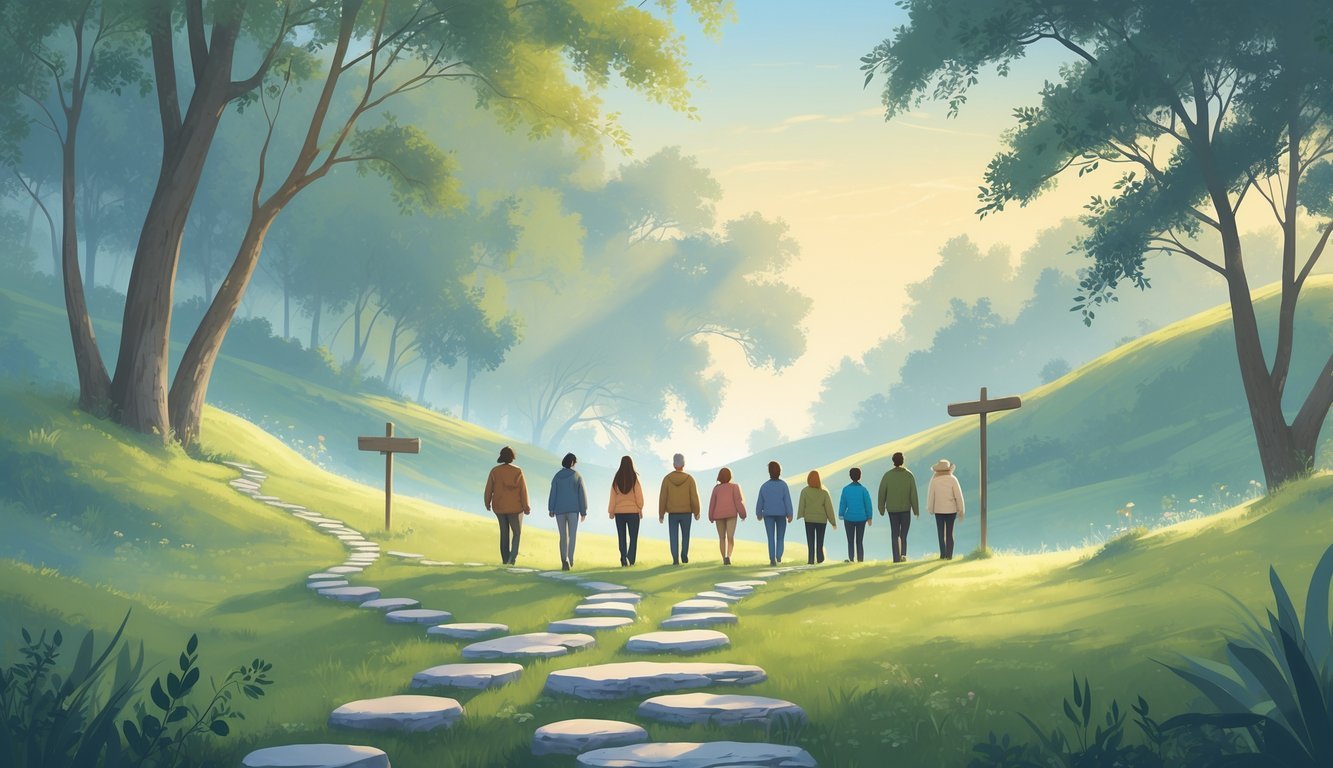PsychNewsDaily Publishers
100 Summit Drive
Burlington, MA, 01803
Telephone: (320) 349-2484
PsychNewsDaily Publishers
100 Summit Drive
Burlington, MA, 01803
Telephone: (320) 349-2484
A spiritual journey fosters personal growth through self-reflection, meditation, and exploration of beliefs, leading to deeper meaning, peace, and connection with a higher purpose.

A spiritual journey feels like a personal adventure—one where you dig into your inner world and look for something bigger than yourself. Sometimes this means traveling, or just sitting quietly and reflecting, or doing little rituals that somehow bring you peace and meaning. Spiritual journeys can really change you, helping you grow both emotionally and spiritually.
A lot of people travel to sacred places, hoping to get closer to their faith or just to figure out life a bit more. These trips create memories and bonds, leading to a stronger sense of purpose.
But honestly, you don’t need a plane ticket to start your own spiritual journey. It can start with a simple moment of meditation or a little self-reflection.
Whether you’re looking for peace, answers, or just a new perspective, a spiritual journey is about making your own experience matter. It helps you find inner strength and get a clearer sense of what’s really important to you.

When you start looking into spirituality, you’ll notice it’s a process of learning about yourself and growing bit by bit. You might go through stages where you become more aware of your life, beliefs, and purpose.
Certain key ideas guide you along the way.
A spiritual journey is your own process of finding meaning and connection beyond the daily grind. You explore your inner self to figure out who you really are and what’s most important.
This path isn’t always obvious or easy. You might question your beliefs, run into challenges, or suddenly have those moments of insight—some people call these spiritual awakenings or transformations.
You might find more peace and understanding, sometimes even a sense of enlightenment or fulfillment.
Your journey is yours alone. It might include spiritual practices like meditation, prayer, or just thinking things through. These help you connect with deeper parts of yourself and build self-awareness.
Most spiritual journeys have stages you move through as you grow. These stages help you see your relationship to yourself and the world in a new light.
Here are some common stages:
Nobody moves through these stages in the same order. Your path might loop around or jump back and forth, depending on your life.
If you want to make progress on your spiritual path, a few things really matter:
These elements work together and support your spiritual transformation. They help you reach deeper understanding and fulfillment.

Your spiritual journey is unique, full of self-discovery, connection, and growth. You can find meaning by exploring your beliefs and trying out different habits in your daily life.
Challenges will show up, but they help you gain wisdom and inner peace as you go.
Starting your spiritual quest means looking inside yourself to understand who you really are. You might reflect on your beliefs about God, a higher power, or just the universe itself.
Some people find guidance in spiritual texts, nature walks, or quiet moments of meditation.
You can try out different spiritual paths and traditions to see what fits. Trust your gut as you learn about your life’s purpose and try to connect with your inner self.
This journey turns you into a spiritual wanderer, open to new experiences that help you grow.
Daily habits can really help your personal growth and mindfulness. Simple things like practicing gratitude, meditating, or being present in the moment can bring you closer to peace and compassion.
You might build a routine with reading spiritual resources, journaling your feelings, or spending time outdoors. These practices keep you connected to your soul and give you faith in your path.
Regular meditation, for instance, supports self-reflection and emotional healing.
You’ll probably hit some bumps—emotional wounds or moments of doubt are just part of the deal. You might go through a dark night of the soul or an existential crisis that makes you question everything.
When that happens, lean on compassion for yourself and patience. Use those tough times to build wisdom and deepen your connection with whatever higher power or inner guidance you trust.
These struggles can lead to spiritual enlightenment and a stronger sense of wholeness. Try to embrace them as part of your growth.

Spiritual journeys look different for everyone, depending on where you go and why you travel. You might find unique experiences in new places, discover ways to share your story, and see how these travels help you grow.
You’ll probably run into different cultures, beliefs, and practices that open your mind. Each place brings its own rituals and moments for reflection.
You might also face challenges that make you think about your purpose.
Umrah is a special pilgrimage to Mecca that you can do any time of the year. It’s shorter and less demanding than Hajj, but you still take part in important rituals like Tawaf and Sa’i.
The focus is on devotion and cleansing.
Ziyarat means visiting holy sites, mostly from Islamic history. Important places include the shrines of prophets and saints.
Visiting these sites helps you connect with your faith and the stories behind it.
Share clear photos and use simple captions to explain what the experience means to you. Posting regularly lets others follow your progress.
Just remember to be respectful of the places and people you share about.
They often inspire self-reflection and help you understand your beliefs more deeply. You might learn patience, empathy, and how to handle discomfort.
These journeys can clarify what matters most in your life.
First, ask yourself why you want to go on this journey. What are you hoping to find out there?
Take some time to research your destination. Planning your trip ahead of time can make things a lot smoother.
Stay open to new experiences. You never really know what you’ll learn along the way.